新目标九年级英语Unit8 Revision
人教版新目标九年级全册Unit 8 t
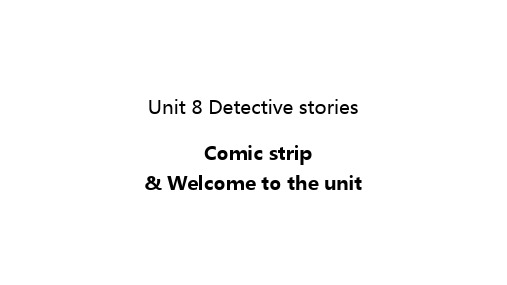
3. I guess Jimmy White is lying. 我猜吉米·怀特在说谎。
1) lie (lied, lied, lying) v. 说谎 n. 谎言
He lied to me again just now. Does he like lying? 他刚才又跟我说谎了,他喜欢说谎吗? We shouldn’t tell lies . 我们不应该说谎。 2) lie(lay, lain, lying) 躺,位于 The dog is lying on the ground.小狗正躺在地上。
2. What does Daniel think of Jimmy White? He thinks Jimmy White is helpful.
3. Who does Daniel think may be the murderer? He thinks Frank Johnson may have killed the man.
untidy and nervous.
The person most likely to be the murderer is ________________. The reason is _______________.
1. Why are you dressed like that? 你为什么穿成那样? be dressed like…打扮成……
3. What is he like? He is tall, slim and serious.
Suspect 2 Job: Lives in: Last Saturday: Appearance: Personality:
新目标英语九年级Unit8Reading新目标-人教新目标版九年级全册

is
things for disabled
people
Find out the new words in the letter.
Dear Miss Li, I’d like to thank you for sending
money to “Animal Helpers”, an organization set up to help disabled people. For sure, you have helped make it possible for me to have “Lucky”, who has filled my life with pleasure. Let me tell you my story.
Unit 8 I’ll help clean up the city parks.
No. 11 Middle School
Discuss
Do you often write letters?
Can you tell me how to write a letter?
How is a letter different from an article?
n v
adj adv pron
prep conj
noun
名词
verb
动词
adjective
形容词
adverb
副词
pronoun
代词
preposition 介词
conjunction 连词
3a
Find examples of each part of speech in the reading.
Nouns: money, animal, helpers, people lucky, organization…
人教版基础训练英语新目标九年级全一册答案

人教版基础训练英语新目标九年级全一册答案The latest revision on November 22, 2020与人教版义务教育课程标准实验教科书配套 基础训练(含单元评价卷) 英语(新目标) 九年级 全一册参考答案课时练习部分参考答案Unit 5 It must belong to Carla.第1课时(Section A 1a -2c)2c)课前预习1.(1)must (2)must (3)can’t (4)might/could (5)might/ could2.(1)it (2)one (3)the one3.(1)too much (2)too many (3)much too (4)too many (5)much too (6)too much (6)too much课堂练习一、一、1.B 1.B 2.D 3.D(must 表示推测,变反意疑问句时,要根据它后面的动词来提问的动词来提问) 4) 4) 4——8 CCBBC CCBBC二、二、1.Both of them 1.Both of them 2.belongs to me 3.can can’’t be 4.No 4.No;;needn’t needn’t课后巩固一、1.Whose book ;must be ;author 2.possibly 3.classical music 4.belongs to 5.can can’’t be t be二、1.C ;uncle 2.C ;hers 3.C ;possibly 4.A ;Both of them/They both 5.C 5.C;;at at三、1.Whose can it be/Whose is it/Who do you think it belong to/Who does it belong to 2.Ah ,there’s a red T -shirt 3.I think it can’t be a think it can’t be a boy boy boy’’s/it must be a girl s/it must be a girl’’s 4.Does it have a name on it 5.It’s/It must be Mary’s/Linda’s/…5.It’s/It must be Mary’s/Linda’s/…四、四、11—5 BACBC 6—10 DAABC DAABC 第2课时(Section A 3a -4)4)课前预习一、一、1.because of 1.because of 2.in the symphony hall 3.make up 4.be anxious/worried 5.at the optometrist appointment 6.final exam 6.final exam二、二、1.up 1.up 1.up;;of 2.At 3.of 4.for 54.for 5..during during课堂练习一、一、11—5 DABBD 6—10 ACCBD ACCBD二、二、1.any 1.any 2.means 3.dropped 4.final 5.worried 6.to give give三、1.know ;give ;a call/ring 2.for us to 3.because of4.(1) is John’s 4.(1) is John’s (2)The owner of5.What does 5.What does;;mean mean一、一、11—5 BCACA 6—10 CCDBD CCDBD二、 1.on weekends 2.talk about homework and gossip3.exchange quiz answers and gossipplain about homework ,gossip and talk about computer games5.photos/pictures6.DV clips clips 第3课时(Section B 1-2c)2c)课前预习一、1.see sb.doing sth. 2.a woman with a camera 3.wear a suit 4.run for exercise 5.catch a bus 6.make a movie 6.make a movie二、二、1.chasing 1.chasing 2.watching 3.caught 4.to get 5.wearing 5.wearing 课堂练习1—5 CDCDD 6—10 ACBCB ACBCB课后巩固一、一、1.must be 1.must be 1.must be;;working 2.runs for exercise 3.woman with a child 4.made 4.made;;movies 5.be late for 5.be late for;;run to catch run to catch二、1.What’s happening/What’s happening to him/What’him/What’s s he running for 2.he might be late for work 3.I 3.I don’t think so don’t think so don’t think so4.It could be a helicopter5.It must be a UFO 5.It must be a UFO三、1.reported 2.have been seen 3.have made 4.to believe 5.to decide 6.came 7.was flying 8.noticed 9.to meet 10.moved 10.moved第4课时(Section B 3a -4)4) 课前预习一、一、1.escape/free from 1.escape/free from 2.in our neighborhood 3.there must be…be… 4.something strange 5.next door neighbor te te--night footsteps footsteps二、二、1.in our neighborhood 1.in our neighborhood 2.anything strange 3.escaped from 4.next door neighbor 54.next door neighbor 5..There must beThere must be 课堂练习一、一、11—5 ADBAB 6—10 CDCCB CDCCB二、1.knocking 2.director 3.extremely 4.happy/unhappy5.to stop6.is 6.is;;left7.to get 7.to get三、三、1.noise 1.noise 2.voice 3.sound 4.Sounds 5.voice 5.voice 课后巩固一、1.was interviewed ;something strange 2.must be ;having fun 3.next door neighbor ;might/could be 4.trying to get in5.In my dream 5.In my dream;;an ocean of paper6.There must be 6.There must be;;visiting visiting;;in our neighborhood neighborhood 二、二、11—5 DBDCA DBDCA三、 1.happening 2.director 3.escaped 4.noise5.garbage6.really7.worried8.caught9.forget10.possibly 10.possibly第5课时(Self Check & Reading)一、1.smell 2.lift 3.dishonest 4.finger 5.bark6.attempted 6.attempted二、二、1.dishonest 1.dishonest 2.unhappy 3.impossible 4.dislike/unlike5.careful6.impolite7.unable8.helpless9.irregular 9.irregular 课堂练习 一、一、11—5 BACAC 6—10 BACBD BACBD二、二、1.of 1.of 2.up 3.of 4.for 5.about about课后巩固一、一、1.attempt to 1.attempt to ed up 3.be careful of 4.getting on the plane 5.pretends to 6.tried to 6.tried to二、二、1.C 1.C 1.C;;use it up 2.D 2.D;;not to see 3.C 3.C;;to fall 4.A 4.A;;can’t can’t 5.C 5.C;;is is三、三、11—5 BBDCD 6—10 CADBA CADBA四、四、11—5 CDBBA CDBBA相关链接一、一、11—2 CC CC 二、二、11—5 ACDBE ACDBE。
九年级英语新目标unit 8新授课课件

Phrasal verbs: cheer up, run out of, put up, call up, hand out, set up, come up with, fix up, give away.
Who can find the missing words faster ?
Last week everyone was trying to__ch_e_er_u_p_ Jimmy, the Bike Boy. But this week, Jimmy is happy again. On Monday he told a radio interviewer that he had _r_u_n_o_ut_o_f money to buy old bikes. He also __p_ut_u_p__ some signs asking for old bikes and _c_a_ll_ed_u_p_ all his friends and told them about the problem. He even __ha_n_d_ed_o_ut advertisements at a local supermarket. Then he told the teachers at school about his problem and they __se_t _up___ a call-in center for parents. The strategies that he _c_a_m_e_u_p_w_it_h worked out fine. He now has sixteen bikes to __fi_x _up__and _g_iv_e_a_w_a_y to children who don’t have bikes.
2014人教新目标版九年级Unit8._It_must_belong_to_Carla.单元整体课件

She can’t find her schoolbag. She lost her schoolbag.
She remembered putting it in the music hall. Because she attended a concert yesterday.
A rabbit is playing the piano.
They are having a picnic.
Look and
?
can’t 在此表示猜测, guess. 译为“不可能”,后接 Who is she? 在此表 may/might/could 动词原形。 示猜测,译为“也许,可 She can’t be Guo Jingjing. 能”,后接动词原形。 must 在此表示猜测,译 She may/might/could be 为“肯定,极可能”,后 Wang Nan. 接动词原形。 She must be Zhang Yining.
1. The person ________ must go to our school. 2. The person ________ can’t be a boy. 3. It ________ could be Mei’s hair band.
4. The hair band _______ might belong to Linda.
Oh, yes. She is Zhang Yining.
What kind of animal is it? It can’t be…… 可 能性0%
It might/could be… 可 能性20-80% It must be … 可能 性100%
Revision教案

Revision教案题B 期中Revisin教学目标知识与技能:dule 1 Unit 1≈ 2 中的知识点过程与方法:通过练习的方法进行巩固。
情感、态度与价值观:/教学的重、难点dule 1 Unit1≈ 2 中的单词,词组,以及重点句型。
教学流程备注1 Read the texts2 Revie ≈ reite the rdsrise, shad, g dn, inside, use, ie, herr, hide, durian, bl, flat, straberr, bell, areful, asleep, aae, bth, sredriver, usial, instruent, shae, shaer, string, heel, sa, quiet, lud, haer3 Revie se phrases在早上,在空中,在大楼旁边,我的影子,张开你的眼睛,红的一些,一些樱桃,对不起,太安静了,小心,骑自行车,给某人某物,不用谢,一个乐器,剪下,摇动摇动器。
4 Anser the questinsT: hat des the sun d in the rning?T: H is the shad in the rning?T: here is ur shad in the evening?T: Des the sun g dn in the evening?T: here is ur b?T: hat have u gt? etExerises用所给词的适当形式填空(不得重复):sur, in frnt f , behind, d nt, stand, se, glass, ne1 Dann ____ lie lies The’re t _______2 Peter is tall Ben is shrt Ben _____ __________ Peter3 father lies ______ It’s bad fr hi4 iss Fang an’t see her ______ The’re n her head The bl’s shad is lng in the rning It’s _____ the bl6 D u ant an straberries? es, I ant seet ___________改变句型1 There are se green plus inside the bx (一问, 否回)_____________________________________2 Granda has gt se durians in her handbag __________________________3 He es he at 4:00 in the afternn(hen) ___________________________4 r hen eats a lt f fruit ever da(否定句) ___________________________i, please ut ut the shad (现在进行时)____________________________完成对话A: L at _____ _______ It’s shrt in the afternn B: es, the sun _______ _______ nA: hen ______ the sun _______ ________ B: At abut 6:00 in the eveningA: _____________ the shad at that tie?B: It’s ________6 he板书设计教学效果的反馈1 这节中主要复习dule 1 Unit 1,2中的内容,句型较简单,学生掌握较好。
新目标九年级英语全册Unit8精品教学案

英语九年级上册第八单元导学案执笔人李小娜Section A(共2课时)一、课前预习词汇:查出下列单词的中文意思,并抄写五遍。
hunger()cheer()advertisement()establish()major()commitment()elementary()veterinarian()coach()二、重点讲解及课堂练习c lean up 打扫,收拾干净cheer up (使)高兴起来,使。
精神起来give out 分发,散发put up 张贴,挂起;建起,举起put off 推迟,延期set up 建立,组建come up with 想出,跟上not only…but also… 不但…而且…,主要用来连接两个并列成分,也可以连接两个分句。
not only…but also…连接主语时,其谓语动词的单复数依照“就近原则”确定。
如:Not only you but also Tom is fifteen years old. 连接两个分句时,为了加强语气,可将not only放在前一分句主语之前,这时,主谓应用到装形式。
如:Not only has he been to Beijing but also he has been to Shanghai.sth. takes sb. some time某事花费某人(多长)时间It takes sb.some time to do sth. 做某事花费某人(多长)时间It’ll take you about an hour to write the composition.堂上练习()1. He felt so that he ate three bowls of noodles.A. hungryB. hungerC. hungrilyD. full()2. He sings for groups of people at the city hospital to them .A. set; upB. clean; upC. cheer; upD. put; up()3. Keep quiet ! I'll the examination papers.A. give upB. give outC. give inD. give down()4. Never till tomorrow what you can do today.A. put offB. take offC. be offD. take down()5. He couldn't an answer when I asked him why he was late.A. come overB. catch up withC. come outD. come up with( )6. Your bedroom is too dirty, please __A. clean up itB. clean it upC. clean in itD. clean it in( )7. __ of the two boys got a new English book at the beginning of this term.A. EveryB. AllC. EachD. None( )8. They all the sports meeting yesterday.A. joinedB. attendedC. took part inD. to join( )9. Joy spent two hours __ her aunt.A. to write toB. write toC. writing downD. writing to( )10.--Didn't you give roses to your father on Father's Day?--Oh, not only my father, my grandpa got red roses.A. orB. andC. but alsoD. until家庭作业( )1. My mother always tells me out alone at night.A. goB. not goC. not to goD. don' t go( )2. You are so busy, what do you want me for you?A. doB. doneC. to doD. doing( )3. My father will an important meeting next week.A. joinB. take part inC. join inD. attend( )4.The song made my father his childhood.A. think overB. thinks aboutC. to think ofD. think of( )5.If you still have any other questions, please __ your hand.A. put offB. put downC. put onD. put up( )6.The book is useful to me, so I have to __ 20 yuan it.A. spend; toB. take; onC. pay; forD. cost; on( )7.You can' t put off __ your homework.A. doingB. doC. didD. to do( )8. Can you help me the living room?A. cheer upB. give upC. fix upD. clean up( )9.He puts his love good use working in a hospital,A. on; byB. at; onC. to; byD. to; about( )10. you but also he to attend the meeting.A. Not only; hasB. Not just haveC. Not also; hasD. Not with; have( )11.At last the inventor an idea.A. come up withB. came trueC. pointed toD. opened to( )12.Although he was a child, he tried to find ways __ people life more.A. to help; enjoyB. help; enjoyC. to help; enjoyingD. help; enjoying( )13.He looks sad. Let' s .A. cheer up himB. laugh at himC. cheer him upD. take after himSection B(共2课时)一.课前预习1.词汇查出下列单词的中文意思,并抄写五遍。
新目标九年级英语unit8讲课课件

06
Summary and Review
Key review of this unit
The main idea of this unit
This unit focuses on exploring the theme of "change" in literature and real life, aiming to help students understand the impact of change on individuals and society.
Feedback and suggestions
Regular feedback is provided to students on their performance, pointing out areas where they excel and areas that require improvement.
提供与Unit8主题相关的听力材料, 并设计口语练习活动,提高学生的听 力8中涉及的写作技巧,并提 供写作练习,帮助学生掌握相关写作 方法。
02
Unit Theme
Theme Overview
01
主题概述
本单元的主题为“人与自然”,旨在引导学生了解人类与自然环境之间
New Goal 9th Grade English Unit8 Lecture
Courseware
目录
• Course Introduction • Unit Theme • Vocabulary and Grammar • Text explanation • Practice and Activities • Summary and Review
_Unit 8 Revision课件--人教版英语九年级全册
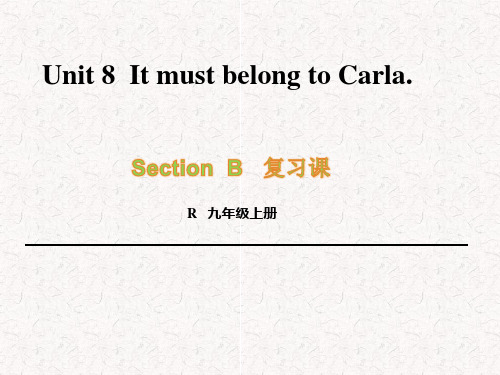
题目要求:
Who could it be?
making inferences not be parents not be a thief might be neighboors may be your aunt
reasons at home not knock at the door want some help like knocking at the door
2.单元句型解析
(1)被动语态的感知
(2)含情态动词的被动结构 情态动词+be+过去分词
Homework
1.复习第8单元单词3+1 2.自己根据所给作文题目要求写一篇作文,周一上交
IV.写作--2.教师点拨
这是一篇议论文,根据题目提示可考虑采用下面的模板。
能否出去?
引出话题 猜测以及理由
总结观点
Who could it be?
引出话题
There was a loud knock at the door at midnight.The knoce woke us up. Who could it be?
猜测 以及观点
It couldn't be my father or my mother,because they were staying at home.It couldn’t be a thief.The thief was afraid,and he couldn’t knock at the door.It might be my neighboor.Maybe he wanted some help.Oh it must be my aunt,because she likes knocking at the door at midnight . 简短结尾
九年级新目标Unit 8

Homework
Please brainstorm a plan for helping out at school if your friend is ill . Write a article with the phrasal verbs we have learned.
Where_____________________________________
____________________________________________
What______________________________________
____________________________________________
Task 2
Read the article and underline all the phrasal verbs.
Last week everyone was trying to cheer up Jimmy, the Bike Boy. But this week, Jimmy is happy again. On Monday he told a radio interviewer that he had run out of money to buy old bikes. He also put up some signs asking for old bikes and called up all his friends and told them about the problem. He even handed out advertisements at a local supermarket. Then he told the teachers at school about his problem and they set up a call-in center for parents. The strategies that he came up with worked out fine. He now has sixteen bikes to fix up and give away to children who don’t have bikes.
人教版英语九年级全册Unit8Revision教学设计
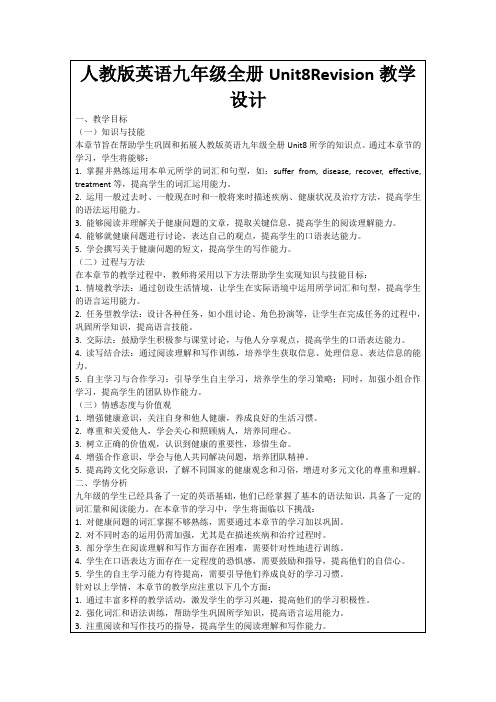
2.对不同时态的运用仍需加强,尤其是在描述疾病和治疗过程时。
3.部分学生在阅读理解和写作方面存在困难,需要针对性地进行训练。
4.学生在口语表达方面存在一定程度的恐惧感,需要鼓励和指导,提高他们的自信心。
5.学生的自主学习能力有待提高,需要引导他们养成良好的学习习惯。
3.树立正确的价值观,认识到健康的重要性,珍惜生命。
4.增强合作意识,学会与他人共同解决问题,培养团队精神。
5.提高跨文化交际意识,了解不同国家的健康观念和习俗,增进对多元文化的尊重和理解。
二、学情分析
九年级的学生已经具备了一定的英语基础,他们已经掌握了基本的语法知识,具备了一定的词汇量和阅读能力。在本章节的学习中,学生将面临以下挑战:
-例如,通过展示医院场景,教授词汇和句型,如“Dr. Smith is suffering from a bad cold. He needs to take some medicine and get some rest to recover.”
2.活动设计:开展小组合作活动,如角色扮演、健康小贴士分享等,促进学生间的互动交流。
2.学生分享自己在小组讨论和课堂练习中的收获和感悟。
3.教师强调健康问题的重要性,提醒学生关注自身和他人健康,养成良好的生活习惯。
4.布置课后作业,要求学生结合本节课所学,撰写一篇关于健康问题的短文,巩固所学知识。
五、作业布置
为了巩固本章节的学习内容,确保学生对健康问题的词汇、语法、阅读和写作技巧的掌握,特布置以下作业:
1.教师设计不同类型的练习题,帮助学生巩固所学知识。
-单项选择题:测试学生对词汇和语法的掌握。
人教版新目标九年级英语第八单元unit8 i will help clean up the city parks 全单元教案
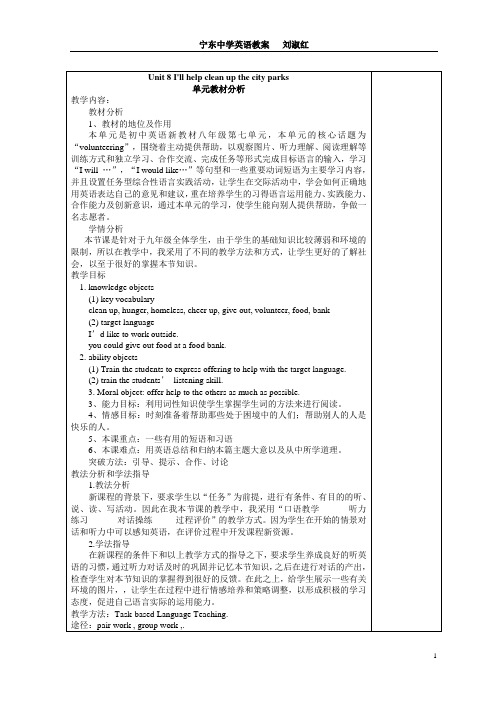
The second PeriodI. Teaching Aims and Demands(教学目的和要求)Knowledge Objects(1)Key Vocabularyclean-up, sign, put off, set up, establish, come up with(2)Target LanguageI’ll help clean up the city parks.2.Ability Objects(1)Train the students’listening skill.(2)Train the students’communicative competence using the target language.(3)Train the students to use the new phrasal verbs: cheer up, set up, come up with, put off/3.Moral ObjectPlan a City Parks Clean-up Day with your good friends and come up with some ideas to tell people about it.Ⅱ. Teaching Key Points(教学重点)1.Listening practice with target language.2.Make communications with target language.3.How to use the phrasal verbs.Ⅲ. Teaching Difficult Points(教学难点)1.Make communications with target language.2.Use the phrasal verbs.Ⅳ. Teaching Methods(教学方法)1.Listening2.Pairwork3.Role play the conversationⅤ. Teaching Aids(教学手段)A tape recorderVI.学情分析:本单元是以九年级英语第八单元“I will help to clean up the city park”为主题,要求学生在实际生活中要保护环境,学生学会在实际生活中能使用英语。
九年级英语全册Unit8I’llhelpcleanupthecityparks2教案人教新目标版
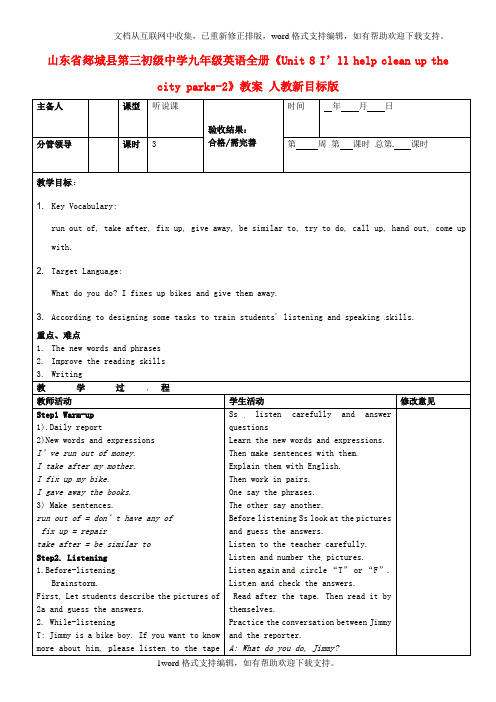
山东省郯城县第三初级中学九年级英语全册《Unit 8 I’ll help clean up thecity parks-2》教案人教新目标版主备人课型听说课验收结果:合格/需完善时间年月日分管领导课时 3 第周第课时总第课时教学目标:1.Key Vocabulary:run out of, take after, fix up, give away, be similar to, try to do, call up, hand out, come up with.2.Target Langua ge:What do you do? I fixes up bikes and give them away.3.According to designing some tasks to train students' listening and speaking skills.重点、难点1.The new words and phrases2.Improve the reading skills3.Writing教学过程教师活动学生活动修改意见Step1 Warm-up1).Daily report2)New words and expressionsI’ve run out of money.I take after my mother.I fix up my bike.I gave away the books.3) Make sentences.run out of = don’t have any offix up = repairtake after = be similar toStep2. Listening1.Before-listeningBrainstorm.First, Let students describe the pictures of 2a and guess the answers.2. While-listeningT: Jimmy is a bike boy. If you want to know more about him, please listen to the tape Ss listen carefully and answer questionsLearn the new words and expressions. Then make sentences with them.Explain them with English.Then work in pairs.One say the phrases.The other say another.Before listening Ss look at the pictures and guess the answers.Listen to the teacher carefully. Listen and number the pictures.Listen again and circle “T”or “F”. List en and check the answers.Read after the tape. Then read it by themselves.Practice the conversation between Jimmy and the reporter.A: What do you do, Jimmy?carefully and then do the tasks.Have Ss listen and number the pict ures[1-4] in the correct order first.Play the recorder and check the answers. Have Ss listen again and circle “T”or “F”.Play the recorder and then check the answers.3. After-listening1)Read and repeat2) Pair workHave Ss practice the conversation between Jimmy and the reporter.Check some pairs.3)Have Ss finish the Exx1on page 87 on Tongbu.Then check the answers.Step3.Summar y and ExerciseTr anslation:1)我们需要提出一个计划2)我喜欢足球,所以我可以训练一支球队。
新目标九年级Unit8英文优秀教案(angela推荐)
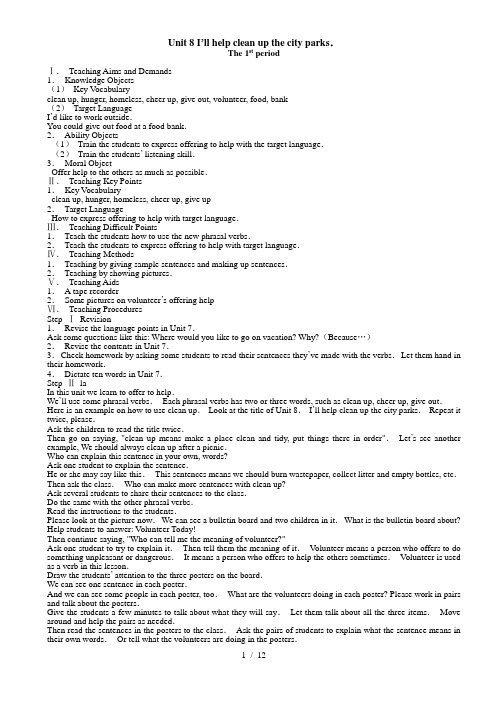
Unit 8 I’ll help clean up the city parks.The 1st periodⅠ.Teaching Aims and Demands1.Knowledge Objects(1)Key Vocabularyclean up, hunger, homeless, cheer up, give out, volunteer, food, bank(2)Target LanguageI’d like to work outside.You could give out food at a food bank.2.Ability Objects(1)Train the students to express offering to help with the target language.(2)Train the students’ listening skill.3.Moral ObjectOffer help to the others as much as possible.Ⅱ.Teaching Key Points1.Key Vocabularyclean up, hunger, homeless, cheer up, give up2.Target LanguageHow to express offering to help with target language.Ⅲ.Teaching Difficult Points1.Teach the students how to use the new phrasal verbs.2.Teach the students to express offering to help with target language.Ⅳ.Teaching Methods1.Teaching by giving sample sentences and making up sentences.2.Teaching by showing pictures.Ⅴ.Teaching Aids1.A tape recorder2.Some pictures on volunteer’s offering helpⅥ.Teaching ProceduresStep ⅠRevision1.Revise the language points in Unit 7.Ask some questions like this: Where would you like to go on vacation? Why?(Because…)2.Revise the contents in Unit 7.3.Check homework by asking some students to read their sentences they’ve made with the verbs.Let them hand in their homework.4.Dictate ten words in Unit 7.Step ⅡlaIn this unit we learn to offer to help.We’ll use some phrasal verbs.Each phrasal verbs has two or three words, such as clean up, cheer up, give out.Here is an example on how to use clean up.Look at the title of Unit 8.I’ll help clean up the city parks.Repeat it twice, please.Ask the children to read the title twice.Then go on saying, "clean up means make a place clean and tidy, put things there in order".Let’s see another example, We should always clean up after a picnic.Who can explain this sentence in your own, words?Ask one student to explain the sentence.He or she may say like this.This sentences means we should burn wastepaper, collect litter and empty bottles, etc.Then ask the class.Who can make more sentences with clean up?Ask several students to share their sentences to the class.Do the same with the other phrasal verbs.Read the instructions to the students.Please look at the picture now.We can see a bulletin board and two children in it.What is the bulletin board about? Help students to answer: Volunteer Today!Then continue saying, "Who can tell me the meaning of volunteer?"Ask one student to try to explain it.Then tell them the meaning of it.V olunteer means a person who offers to do something unpleasant or dangerous.It means a person who offers to help the others sometimes.V olunteer is used as a verb in this lesson.Draw the students’ attention to the three posters on the board.We can see one sentence in each poster.And we can see some people in each poster, too.What are the volunteers doing in each poster? Please work in pairs and talk about the posters.Give the students a few minutes to talk about what they will say.Let them talk about all the three items.Move around and help the pairs as needed.Then read the sentences in the posters to the class.Ask the pairs of students to explain what the sentence means in their own words.Or tell what the volunteers are doing in the posters.For example, for the first poster, a pair might say:It means there is trash in the park.There are papers on the ground.We can help clean up the park by picking up papers and trash.We can make the park clean.After the students have finished all the items, ask the students to add some other ways they can help people.Get them to write the ways down in the box below the picture.At last, ask some students to share their ideas with the class.Write any new words or phrases on the board and explain these words to the class, if necessary.Step Ⅲ1bCall the students’ attention to the two lists in the box in Activity lb.Ask some students to read the eight sentences on the lists to the class.Explain any new words and phrases in it.Make sure that all the students can understand the meanings of the eight items.Then get the children to read the instructions together.Say, we will hear four conversations.Your task is to match the items in the two lists.We can see the blanks in front of the first line of each conversation.Listen to the conversations and write the letter in front of the first line of each conversation.Put the letters of the second line of conversations in right places.Point out the sample answer to the class.Play the recording the first time.Tell the students to only listen.Then play the recording a second time.Tell them to write a letter in front of each numbered sentence this time.Check the answers.Step Ⅳ1cRead the instructions with the class.Call their attention to the example in the speech bubbles in Activity la.Ask a pair of students to read this conversation to a class.Then let them practice in pairs.Note their pronunciation of "like to" in phrases such as, I’d like to help hungry people.Tell them English speakers usually pronounce the words "like to" as if they were spelled like-tuh.Play the I’d like to statements on the recording to demonstrate this pronunciation.After they’ve finished practicing the sample conversation, ask them to make up similar conversations based on the other two posters.Get two pairs to demonstrate two conversations first.Then let the whole class practice in pairs.After that, play the recording of activity 1b and let the children read after it twice.Then ask them to practice similar conversations using the information in Activity 1b.Step ⅤSummaryStep ⅥHomework1.Make up one sentence with each of the following phrasal verbs:clean up, cheer up, give out2.Write out three conversations of activity 1c.Step ⅦThe 2nd PeriodⅠ.Teaching Aims and DemandsKnowledge Objects(1)Key V ocabularyclean-up, sign, put off, set up, establish, come up with(2)Target LanguageI’ll help clean up the city parks.2.Ability Objects(1)Train the students’ listening skill.(2)Train the students’ communicative competence using the target language.(3)Train the students to use the new phrasal verbs: cheer up, set up, come up with, put off/3.Moral ObjectPlan a City Parks Clean-up Day with your good friends and come up with some ideas to tell people about it.Ⅱ.Teaching Key Points1.Listening practice with target language.2.Make communications with target language.3.How to use the phrasal verbs.Ⅲ.Teaching Difficult Points1.Make communications with target language.2.Use the phrasal verbs.Ⅳ.Teaching Methods1.Listening2.Pairwork3.Role play the conversationⅤ.Teaching AidsA tape recorderⅥ.Teaching ProceduresStep ⅠRevision1.Revise the knowledge points on Page 60.Ask several students to tell some ways they could help people with books closed.2.Check homework by asking several pairs to read their conversations which they wrote down.3.Check homework by asking some students to read their sentences with the phrasal verbs.Let them hand in their homework.Step Ⅱ2aWe can see five pictures in Activity 2a.What can you see in each picture?Ask five different students to describe the pictures.After that, ask a student to read the words on the TV screen, on the sign and in the newspaper.We’ll hear some students at a club meeting.They are talking about how their club can help clean up the city parks.Ask the class to read the instructions together.Tell them to note the box of each picture, they will have to tick in the boxes of the items they hear on the recording.Now listen to the club members talking about what they can do to clean up the city parks and tick in the right small boxes.Play the recording the first time.Students only listen.Play the recording again.Ask students to check the things they hear.Check the answers.Step Ⅲ2bRead the instructions with the class.And let them have a look at the sentences.Read the first sentence to the students.Tell them it is a sample answer.Say, We will hear the same recording again.This time listen carefully to what the students say and fill in the blanks in the sentences.Play the tape again and the students write out the answers.Check the answers.Step Ⅳ2cAsk students to look at the sample conversation first.Ask a pair to read it to the class.Ask the class to read the instructions together.Say.You’ll work in pairs to role play the conversation in Activity 2b.Each pair will make a conversation like the sample one.You can use the sentences in Activity 2b as a guide.Ask the students to work in pairs.More around the classroom, checking the progress of the pairs and offering help as needed.Ask one or two pairs to say their conversations to the class.Step ⅤGrammar FocusSay, Do you remember the meaning of cheer up? Who can tell us?Ask a student to explain the phrasal verb cheer up like this:Cheer up means make someone happy.Then get students to make up some sentences with it.Say, Let’s learn some more phrasal verbs today.Please open your books at page 61.Look at the content in Grammar Focus and try to tell me the meanings of set up and come up with.Ask two children to tell their meanings like this:Set up means establish or start.Come up with means think up.Then get students to read the sample sentences in the grammar box.Write the phrasal verbs and the sentences on the blackboard.Get students to make more sentences with these phrasal verbs to get a further understanding.Step ⅥSummarySay, In this class, we’ve done some listening and writing practice with target language.We also did some oral practice in pairs.And we’ve discussed some phrasal verbs as well.Step ⅦHomework1.Write two conversations like the sample in Activity 2c.2.Make up one sentence with each of the following phrasal verbs: set up, come up with, put off, hand out, call up Step ⅧBlackboard DesignThe 3rd PeriodⅠ.Teaching Aims and Demands1.Knowledge Objects(1)Key V ocabularymajor, commitment, veterinarian, coach(2)Target LanguageI’d like to join the school volunteer project.You could help coach a football team for little kids.2.Ability ObjectsTrain students’ reading skill.Train students’ speaking skill with target language.Train students’ writing skill with target language.3.Moral ObjectIf there is a student volunteer project in your school, try to join it。
中考英语新目标九年级英语Unit8
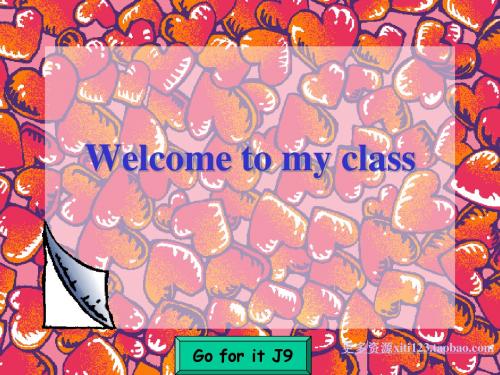
Go for it J9
更多资源 更多资源
A guessing game
help
Do you often help others?
Tell us something about the last time you helped others.
cheer up clean up put off
set up come up with
Lei Feng Day is two weeks from now. We need to come up with a plan. What would you like to do? Talk with your partner and come up with a plan. A: We need to come up with a plan. B: Let’s have lunch first. A: No’ we can’t put off making a plan. Clean-Up Day is only two weeks from now. B: ….
Name Hui
Loves football
Could
Xiao Tang writing stories Joy Wei movies music
Role play. Take turns being one of the people in the article. Ask for and give advice.
other ways you could help people
_____________________ _____________________ _____________________ _______________________ _______________________ _______________________
- 1、下载文档前请自行甄别文档内容的完整性,平台不提供额外的编辑、内容补充、找答案等附加服务。
- 2、"仅部分预览"的文档,不可在线预览部分如存在完整性等问题,可反馈申请退款(可完整预览的文档不适用该条件!)。
- 3、如文档侵犯您的权益,请联系客服反馈,我们会尽快为您处理(人工客服工作时间:9:00-18:30)。
homework
1.Words and phrases of Unit 9. 2.Paper exercises.
பைடு நூலகம்
Retell: Last week everyone was trying cheer up to_______Jimmy, the Bike Boy. But this week, Jimmy is happy again. On Monday he told a run out of radio interviewer that he had_______ money to buy old bikes. He also put up _____some asking for signs________old bikes and called up _______all his friends and told them about the problem. He handed out even__________advertisements at a local supermarket. Then he told the teachers at set up school about his problem and they _____a call-in center for parents. The strategies that he came up with worked out fine. He now has ________ fix up sixteen bikes to _____andgive away children _______to who don’t have bikes.
19.想出 think up, come up with, 20.六个月的训练 six months of training six--month training six months’ training
Not only …but (also)…
1)Not only the students but also their teacher likes football. 2)She can not only sing but also dance. 3)I went to see not only him but also his brother. 4)当not only 位于句首时,前一个分句倒装但连接 并列主语除外. Not only did he come,but also he was very happy.
2.分发(3种) give away, give out, hand out 3.out的词组: give out, hand out, work out, run out, run out of, keep out, look out, get out, help out, come out, (be)stressed out, clean out, hang out, take out,
•fetch / carry / bring / take bring •把某物带给说话人或说话人地点:__________ take •把某物带到另一地方,远离说话人地点:______
carry •用手或身体的某个部分携带,没方向:_______
fetch •去取某物并把它带回来:________
2.What kinds of volunteer work could you do ? Say at least three things.
1.up的词组:
cheer up, make up, put up, think up, give up, stay up, show up, fix up, use up, clean up, set up, call up, wake up, look up, pick up, end up, cut up , open up, dress up, grow up, mix up, come up with,
9.盲的/聋的/富的/穷的 the blind/ the deaf/ the rich/ the poor 10.与“高兴”有关 的 sb.be pleased with… sth. be pleasant with pleasure / It’s a pleasure.
11.广告 advertisement,advertising
4.off的词组: take off, put off, turn off, break off go off, run off, set off,
5.相似的;相像等 be similar to, take after, look like, be like 6.修理 : fix up, fix, mend ,repair
bring, take,
fetch, carry
17.不但…而且…
not only…but also… V就近 =both…and…V复 either…or…/neither..nor… V就近
18. volunteer
volunter one’s time to do… volunter to do… Voluntering is great!
Unit8:
I’ll help clean up the city parks.
Teaching Aims:
1. Words & Phrases
2 . Grammar: Phrasal verbs
3. Topic : talk about volunteer
1.Do you want to be a volunteer in 2008? What will you do at that time?
12. 建立 set up, establish, start, build
13. 组织 organize, organized, organization
14.与“关”有关的
close, turn off, shut, shut down,
15. 用光 sth.run out, sb. run out of sth, sth. be used up, sb. use up sth 16.
7.与“装满”有关的 sb. fill … with… sth. be filled with… sb. be full of… filling He is _____ his bag with ____books. The bag ___ filled ___ books. is ___ with 8.与“able”有关 的 be able to, be unable to disabled
用not only… but also…合并 I feel good about helping other people. I get to spend time doing what I love to do.
Not only do I feel good about helping other people, but also I get to spend time doing what I love to do.
